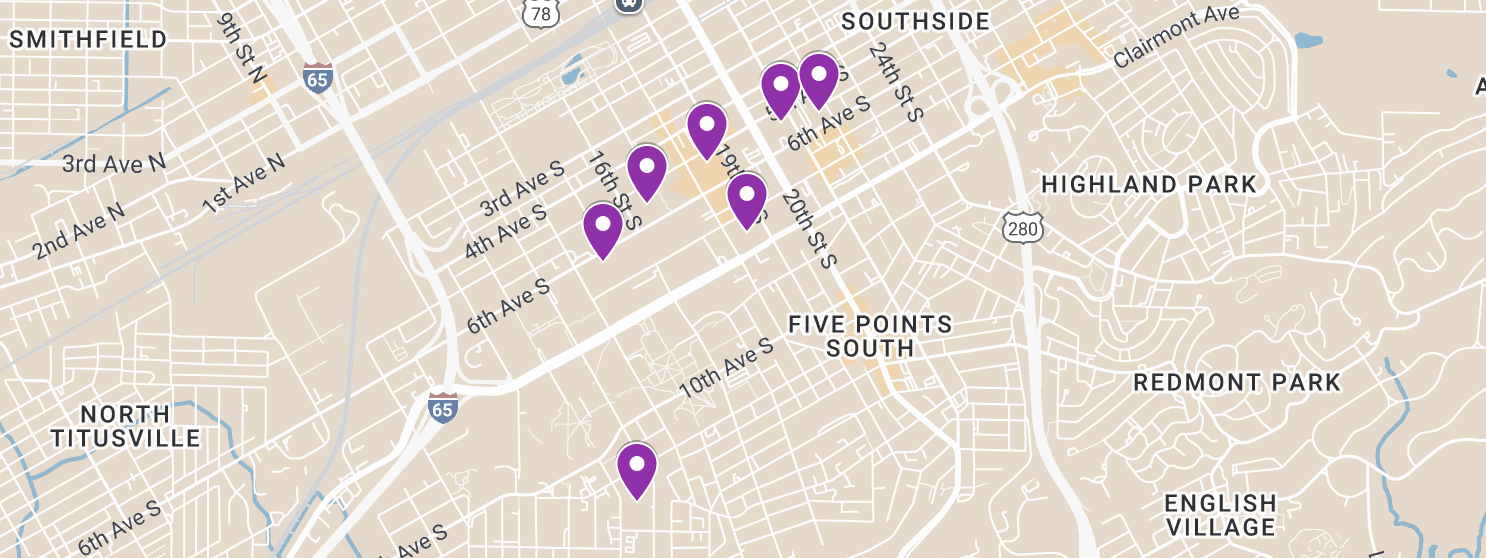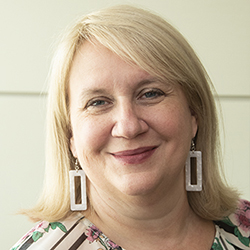In our comprehensive two-year fellowship program, you will receive a broad range of hands-on clinical experience and individualized instruction from nationally known physicians and investigators in a collegial environment.
Fellowship Experience
Our program provides superior endocrine training in a collaborative environment. We have specialty clinics across our medical campus, which is anchored by our 1,200 bed inpatient center UAB Hospital—the eighth largest public hospital in the nation. The hospital is in close proximity to the Birmingham VA Medical Center, UAB Hospital Highlands campus, The Kirklin Clinic, and Children's Hospital of Alabama where fellows also train.
Patients come from all over the state to take advantage of our life-changing care, offering a broad range of clinical learning experiences in both inpatient and outpatient settings. We approach medicine in a multi-disciplinary modality across a broad variety of endocrine-related conditions through mandatory and elective rotations. We accept applications through the Electronic Residency Application Service.
Clinical Rotations
 UAB is a highly walkable campus, making it easy to navigate your clinical rotations. Many of our clinical training sites are connected by skybridges, offering protection from rain, heat, and traffic. Browse these buildings to learn more about the types of training conducted there.
UAB is a highly walkable campus, making it easy to navigate your clinical rotations. Many of our clinical training sites are connected by skybridges, offering protection from rain, heat, and traffic. Browse these buildings to learn more about the types of training conducted there.
Explore our training sitesOpens an external link.
In addition to our general endocrinology inpatient consult service, fellows will rotate through our multidisciplinary glycemic control service that helps hospitalized patients manage their diabetic condition.
On the outpatient side, our Pituitary Clinic is supported by experts in otolaryngology/skull-base surgery, radiation oncology, and ophthalmology. Our Osteoporosis Prevention and Treatment Clinic, brings together endocrinologists, rheumatologist, geriatricians, nutrition educators and physical therapists to care for adult patients with a range of metabolic bone diseases. In our Fine Needle Aspiration Biopsy Clinic, fellows work with pathologists to learn how to prepare specimen slides and assess for sample adequacy. Our Insulin Pump & CGM Clinic provides comprehensive diabetes care using mainly diabetes technology.
The Gender Health Clinic provides knowledge and experience in the medical management of gender dysphoria and related conditions. In the HIV Endocrine Clinic, fellows receive training in effectively collaborating with infectious disease specialists and other healthcare providers to provide comprehensive care for patients living with HIV.
UAB Weight Loss Medicine is a medical obesity clinic that includes endocrinologists, hepatologists, nurse practitioners, dietitians, and exercise trainers. Fellows can evaluate for underlying causes of obesity, initiate and adjust anti-obesity medications, learn nutrition therapy, and understand endoscopic and surgical treatments for the disease of obesity.
Teaching Conferences
Our training program is designed to provide our fellows with significant opportunities for teaching. Fellows are expected to help train/teach our residents and students rotating through the service while in charge of the consult service. Fellows discuss cases and formulate a management plan together with the residents and students prior to rounds with the supervising attending on a daily basis. Fellows are also required to present and discuss cases at our conferences, as well as deliver lectures to medical students on a basic or clinical endocrine topic.
Endocrinology Grand Rounds is a weekly opportunity for our faculty, fellows, and staff to hear from experts in a multitude of fields both within and outside of UAB. Topics vary from ongoing research projects to clinical vignettes with discussion of an endocrine disease process.
Best Case of the Week is a weekly interactive multi-disciplinary discussion and opportunity for fellows and faculty to present interesting cases or diagnostic dilemmas. Journal Club is an opportunity for fellows to learn the importance of scientific inquiry and analysis of the data.
The Core Curriculum Lecture Series covers the “bread and butter” of endocrinology through a series of case-based lectures early in the academic calendar year. Our Board Review Conference Series are interactive and involve fellows going through self-assessment programs facilitated by a faculty member.
Research Opportunities
Research is an essential part of our training program. Our fellows are required to find a mentor during the first few months of training and begin working on their projects during their first year. Research time increases significantly during the second year of training and fellows are expected to devote approximately 70 percent effort to their research projects. Research may be in clinical or basic science projects depending on fellow interests. By the end of the second year of training, our fellows are expected to prepare their research findings and submit them for publication. Presentation of their research findings at regional or national scientific meetings is strongly encouraged.
Internal Medicine and Pediatric Endocrinology Fellowship Pathway
At UAB, we have worked collaboratively to establish a combined Internal Medicine and Pediatric Endocrinology Fellowship Pathway. Our first fellow applicants should apply through the Internal Medicine / Adult Endocrinology 2025 ERAS Match. We look forward to working closely together as program leadership to help train future Med-Peds Endocrinologists in a clinically diverse university system. Our fellows will see patients in clinics for adult and pediatric endocrinology throughout their four-year training and be exposed to didactics and learning on both sides. In this pathway, fellows will have the opportunity to work at the University hospital main campus, UAB Highlands, the Birmingham Veteran’s Administration Medical Center, and Children’s of Alabama. We have numerous Med-Peds trained faculty who will be involved in mentorship. We are thrilled about this exciting endeavor.
For information about applying as a Med-Peds Endocrine fellow, please contact Julie Burge, Endocrinology program coordinator or Toni Davison, Pediatric Endocrinology program coordinator.
Children's of Alabama Pediatrics Endocrinology
Let's get acquainted
It's not just what you learn. It's also about the people you learn with. Our endocrinology fellowship program leaders are dedicated to developing the potential of every talented trainee.
Meet our people
Program Signaling
While we preferentially review applications from those who signal our program, we also consider other factors in an applicant’s portfolio in making a decision on extending an interview invitation.
Frequently Asked Questions
-
What will I need to apply?
All applications are reviewed via Electronic Residency Application Service® (ERAS), #1007143F0. The following documents are required:
-
Current CV (updated within 3 months)
-
Medical School Transcripts (and diploma if requested)
-
Medical School Dean’s Letter
-
Three (3) total Letters of Recommendation (including former program directors)
-
Certificate/verification from previous residency training
-
Must be eligible for Alabama Medical License and Alabama Controlled Substance Certificate (all step scores completed at the time of application)
-
Must be eligible for Federal DEA registration
-
Valid ECFMG Certificate (IMG only)
We do not accept any additional documents outside of ERAS submissions.
-
-
Are there work requirements to train at the VA?
UAB fellowship programs are fortunate to partner with the Birmingham Veterans Affairs Health Care System as a part of our training experience.
Am I Eligible Checklist: Please ensure that you meet the eligibility requirements for training at the VA by accessing the “Am I Eligible Checklist.” Failure to be able to rotate at a major teaching location will, in most cases, result in a revocation of an offer to train, termination, or non-renewal of your GME Agreement.
Selective Service Registration: VA policy states that any male U.S. citizen who did not register for selective service before age 26 is not eligible to work at a VA, no exceptions. You can register for selective service or verify that you have already registered for selective service online with the U.S. Selective Service System.
-
What are the current vaccination requirements?
Vaccinations are required based on CDC recommendations for Health Care Workers including routine childhood vaccines, Hepatitis-B, COVID-19 and Influenza, except in the case of an approved exemption.
-
What are the salaries & benefits for fellows?
Our program provides benefits and insurance plans available to all fellows at UAB. You can find the list of salaries and benefits for fellows based on PGY level here.
-
What is the cost of living in Birmingham?
Birmingham offers a vibrant urban lifestyle at a cost that’s approximately 9% below the national average. Trainees enjoy access to thriving neighborhoods, a nationally recognized food scene, and a dynamic creative community.
-
Is there a minimum USMLE score required?
There is no minimum USMLE score requirement. We take the score into account as part of the overall review of an application.
-
What are the key program dates for Applications?
Applications Open and Close — June through May: Apply through ERAS
Applications Reviewed — July, must be available by August 1
Interview Invitations Released — last week in August
Interviews Begin — September and continue through October
Match Day — November
Fellowship begins — July 1
-
Do you sponsor H1B or J1 Visas?
Yes, the division can sponsor these Visas.
Got more questions? Reach out and let's talk.
 I'd be delighted to talk with you about the many exciting possibilities that await you at UAB and Birmingham. Contact me for more details about the endocrinology fellowship.
I'd be delighted to talk with you about the many exciting possibilities that await you at UAB and Birmingham. Contact me for more details about the endocrinology fellowship.
Julie Burge, Education Coordinator
(205) 934-9886
Send an Email